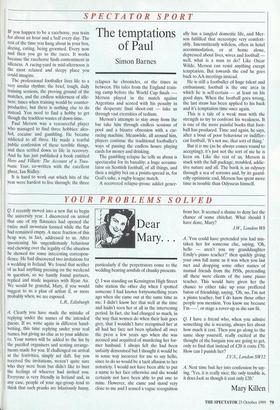SPECTATOR SPORT
The temptations of Paul
Simon Barnes
IF you happen to be a racehorse, you train for about an hour and a half every day. The rest of the time you hang about in your box, dozing, eating, being groomed. Every now and then you go to the races. It works because the racehorse finds contentment in idleness. A racing-yard in mid-afternoon is the most relaxed and sleepy place you could imagine.
The professional footballer lives life to a very similar rhythm: the brief, tough, daily training sessions, the proving ground of the matches, and the endless wilderness of idle- ness: times when training would be counter- productive, but there is nothing else to do instead. You need to find a hobby to get though the trackless wastes of down-time. Paul Merson was a resourceful player who managed to find three hobbies: alco- hol, cocaine and gambling. He became addicted to all three. He made a tearful public confession of these terrible things, and then settled down to life in recovery. And he has just published a book entitled Hero and Villain: The Account of a Trau- matic Year, co-written with the excellent ghost, Ian Ridley.
It is hard to work out which bits of the year were hardest to live through: the three relapses he chronicles, or the times in between. His tales from the England train- ing camp before the World Cup finals Merson played in the match against Argentina and scored with his penalty in the desperate final shoot-out — take us through vast eternities of tedium.
Merson's attempts to stay away from the bar take him through endless sessions of pool and a bizarre obsession with a car- racing machine. Meanwhile, all around him, players continue the traditional footballer's ways of passing the endless hours: playing cards for money and drinking.
The gambling relapse he tells us about is spectacular for its banality: a huge accumu- lator on Scottish football, of all things, and then a mighty bet on a points-spread in, for God's sake, a rugby-league match.
A recovered relapse-prone addict gener- ally has a tangled domestic life, and Mer- son fulfilled that stereotype very comfort- ably. Intermittently wifeless, often in hotel accommodation, or at home alone, depressed about lives, wives and football well, what is a man to do? Like Oscar Wilde, Merson can resist anything except temptation. But towards the end he goes back to AA meetings instead.
He is still a footballer of huge talent and enthusiasm; football is the one area in which he is self-certain — at least on his good days. When the football goes wrong, the last straw has been applied to his back and it's temptation time once again.
This is a tale of a weak man with the strength to try to confront his weakness. It is one of the more painful books that foot- ball has produced. Time and again, he says, after a bout of poor behaviour or indiffer- ent football, 'It's not me, that sort of thing.'
But it is me (as he always comes round to accepting); it's just not the sort of me he is keen on. Like the rest of us, Merson is stuck with the full package, troubled, addic- tive nature and all. The book is an odyssey through a sea of sorrows and, by its guard- edly optimistic end, Merson has spent more time in trouble than Odysseus himself.


















































































 Previous page
Previous page